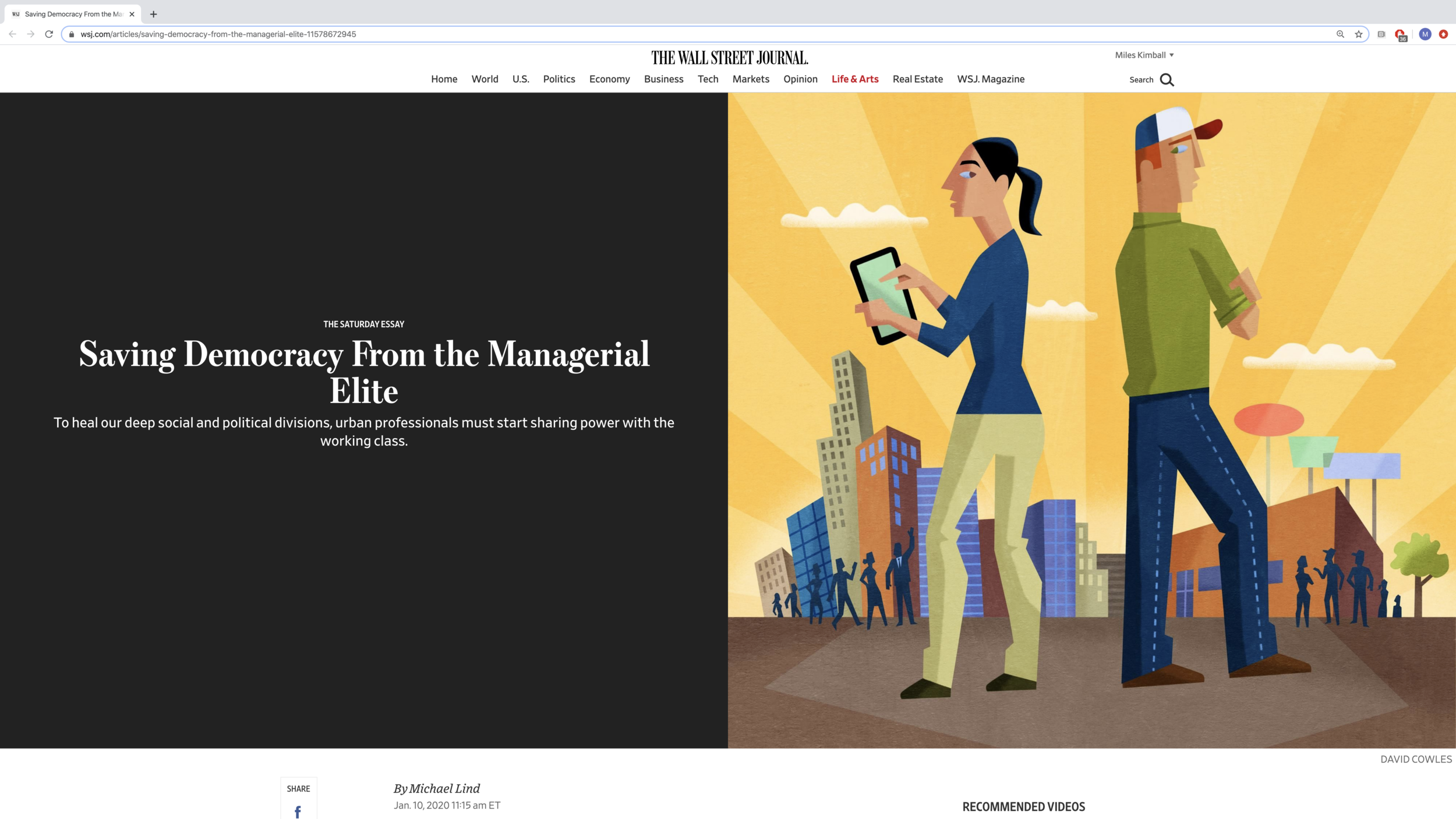Michael Lind: College-Educated vs. Not is the New Class War
Michael Lind’s teaser for his new book The New Class War: Saving Democracy from the Managerial Elite makes a basic point about our current political and cultural situation: the big political and cultural divide in the United States and other advanced countries is now between those who have gone to college and those who haven’t. As Michael writes:
The deepest cleavage in Western democracies yawns between college-educated managers and professionals—a third of the population, at most—and the majority who lack college educations.
More precisely, he writes that recent populist insurgencies in the US, UK and France are:
… the revolt of alienated, mostly but not exclusively native and white working-class voters against post-national metropolitan elites.
That is, the college-educated have allied with minorities and immigrants.
There is also a geographical dimension to the divide. In addition to pointing to the kinds of forces discussed in “Janet Adamy and Paul Overberg on Immobility in America,” Michael points out:
… it is a snobbish mistake to assume that people in “left behind” regions should simply “move to opportunity.” Why should members of the working class move? The jobs that are being created in the greatest numbers in the U.S., including home health aide, retail clerk and restaurant worker, do not require college degrees and can be done almost everywhere.
That is, the wage premium from moving to a city that used to be there for those with low levels of education is no longer there.
Rather than mindless bigotry, Michael argues that those without a college education have a genuine fear (whether well-founded or not) of the economic consequences to them of immigration:
Unwilling to admit that the center-left has been largely captured by the managerial elite, many pundits and academics on the left insist that mindless bigotry, rather than class interests, explains the attraction of many working-class voters to populist parties that promise to restrict trade and immigration. But it is just as rational for workers to prefer a seller’s market in labor as it is for employers to prefer a buyer’s market in labor. Blue-collar workers who have abandoned center-left parties for populist movements bring with them the historic suspicion of large-scale immigration that was typical of organized labor for generations.
Cultural and political conflicts come together over key issues. As Michael puts it:
From its citadels in a few big cities, this oligarchy periodically notifies the working-class majority what values and opinions about sex, immigration and other topics it must immediately adopt without debate, on pain of being blacklisted by the private sector, prosecuted by the government or censored or erased by the media.
Michael points out the flip-side of meritocracy: the implication that those who don’t succeed are failures.
… today’s managerial elite is different. The pretense that it springs solely from “merit”—from individual talent and hard work—creates a false sense of superiority for its members, stoking resentment among their fellow citizens, who are defined as failures in fair competition.
The struggle between the educated+allies and the non-college-educated whites extends to a fight over the rules of the game in which the educated are highly skilled. The educated and allies look to the courts and international institutions staffed by well-educated people to weigh in on their side. Non-college-educated whites sometimes win at the polls, but with the decline of local political machines, private-sector unions and greater separation of church and state have few standing institutions to advocate for their interests. (Michael uses the interesting metaphor of a “tribune” for a standing institution to advocate for non-college-educated whites; the Roman Republic evolved the powerful office of tribune to make sure those below the upper classes had a continuing political say.)
Michael argues the need for new “mass membership organizations accountable to working-class people” and new substitutes for unions that are organized by the government: “bargaining among representatives of all firms and employees in particular industries, occupation-specific wage boards or labor representation on corporate boards.”
Less plausibly, Michael argues for tolerance of cultural differences. I think this unlikely because the key cultural differences are about treatment of women and minorities and about sexuality. The educated and their allies will not compromise on these. And the young have come to accept gay rights so much that they are becoming detached from churches that preach that homosexuality is a sin and look down on gay marriage. (See “That Baby Born in Bethlehem Should Inspire Society to Keep Redeeming Itself.”)
The educated and their allies can come to an economic accommodation with non-college-educated whites, but they aim to win the cultural war. In my view, they have a good chance at doing so.
Related posts:
